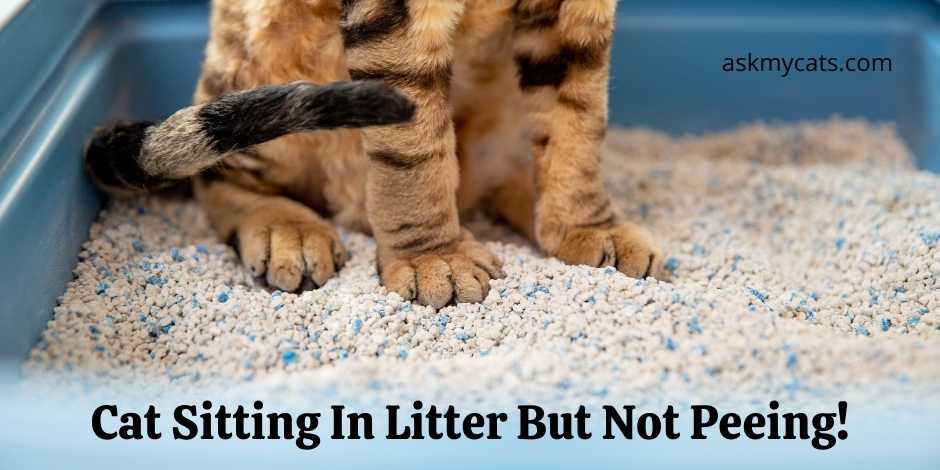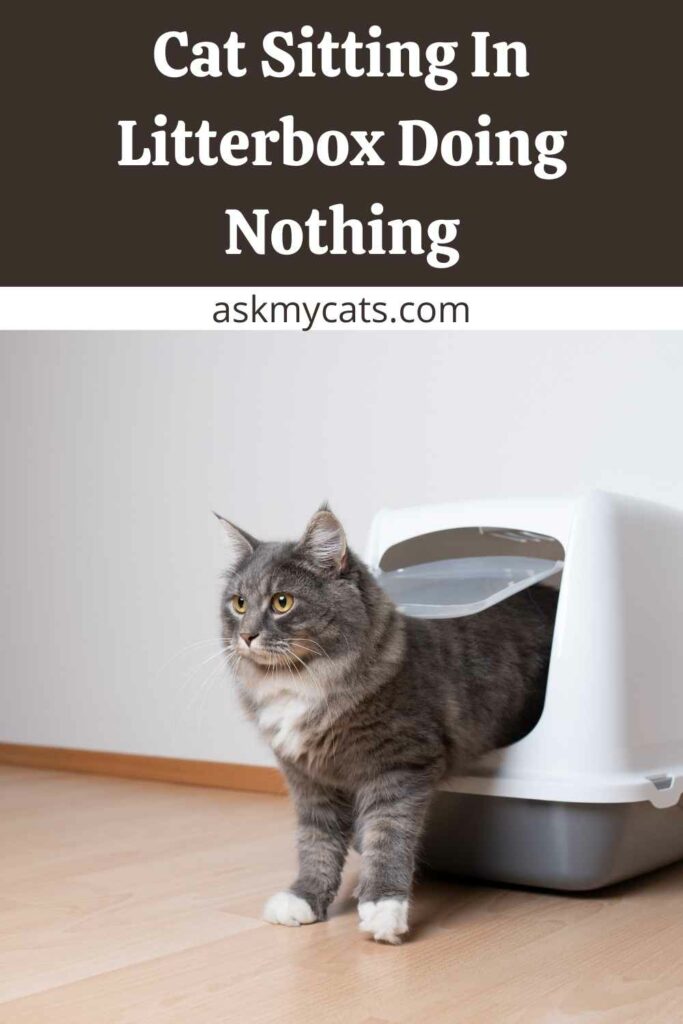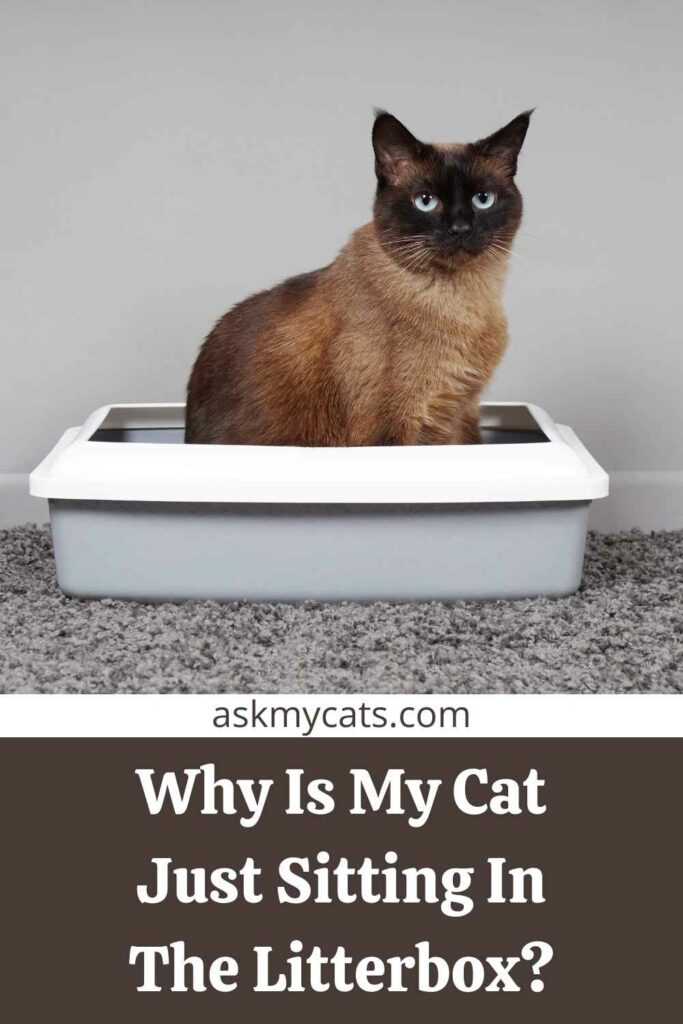It’s time to take your cat to the veterinarian if your cat continues going to the litter box but nothing happens, or if you find your cat urinating in little amounts regularly. How so?
Because your cat moving in and out of the litter box or making repeated, ineffective excursions to the litter box indicates a medical problem.
Your cat may have a urinary tract infection if they come into the litter box and do not make enough pee. It’s also usual for your cat to pee outside the litterbox, especially if he or she is dealing with a stressful situation like a UTI.
Now, let’s discuss more the behavioral and medical issues due to which a cat sits in the litterbox for hours but doesn’t pee!


Give Your Cat the Perfect Day
Get the Free Ebook!
Cat Sitting In Litterbox Doing Nothing
If your cat keeps going to the litter box but nothing happens, he or she might be suffering from a urinary problem. Otherwise, your cat can be suffering from severe constipation. Constipation is more common in middle-aged to geriatric cats (those that are eight years or older).

Cats exhibit a variety of strange habits, and cats like to stay as enigmatic as animal stereotypes suggest, unlike dogs, whose strange activities are rather straightforward to deduce the aim of.
In general, a cat goes to his litter box, performs his thing, and then moves on to lying on your keyboard. This makes sense because there isn’t much room in a typical litterbox for anything else.
However, your cat may occasionally stay in their litter box for longer than the five minutes to defecate. The truth is, while this may appear to be a joking habit, it might indicate something more severe than digestive discomfort.
In reality, there are typically two reasons why your cat would be in there: one is because they’re anxious, and the other is because they’re worried about something.
If your cat spends more than a few minutes inside the litter box, it’s possible that they’re having problems removing solid waste or urine, and that they’re unwell. However, there are techniques to identify if this is the case.
Look to check whether your male cat is kneeling, straining, or scratching the litter while generating very few or no drips of pee. This might indicate that your cat is constipated or obstructed in some way.
Male cats can acquire crystals in their urinary tract, wreaking havoc on their renal system. The crystals tend to gather “down the line” towards the front of the cat’s genitals, blocking urine flow.
This obstruction may be extremely deadly to the cat’s kidneys, and if he isn’t taken to the doctor as soon as the first indications of problems appear, he might die within 48 hours.
Female cats can have urine crystals as well, though it’s uncommon. Feline lower urinary tract disease (FLUTD) can affect both male and female cats, although it is more common in cats that are overweight or have feeding problems.
Interesting Read: Why Is My Cat Sleeping Next To A Litter Box?
Look for cats that appear dehydrated, have difficulty peeing, have blood-tinged urine, or yowl when urinating. A female cat that sits in the litter box for more than a few minutes at a time, on the other hand, is more than likely suffering from a stomach problem.
Other issues might arise in cats as well. If your cat gets a cold or the flu, they may need to go to the litter box frequently, just like you would if you had the virus. In these instances, the cat may choose to remain in their current location until the heinous act is completed.
There’s nothing wrong with a cat who knows what he’s doing. Any signs of obstruction, constipation, or diarrhea, on the other hand, should send you and your partner to the veterinarian as soon as possible.
Also, find out why does my cat play in the litter box
Why Is My Cat Just Sitting In The Litterbox?
Cats might opt to spend most of their time in the litter box in order to enjoy some alone time. A litter box is their haven, where they may be alone.

They can choose to spend the remainder of their time alone in the litter box if they are bored of all the daily tasks.
Cats might spend the majority of their time in the litter box if it is placed in a convenient location in the house. If that’s the case, we can assure you that the cat is delighted with your litter-box-cleaning abilities.
When cats are under hardship or stress, they may act differently. Anxiety problems in cats can be caused by a variety of factors.
One of the most prevalent causes of a cat’s behaving in this manner is a change in the cat’s set schedule.
It’s possible that the litter box is the only spot in the house where they feel comfortable, and it’s doing its best to provide a soothing environment.
This habit is more common in kittens. If they sleep in the litter boxes, the kitten is more likely to keep up the behavior. They may find a compact, snug litter box more pleasant than a cat bed.
Some cats have a strong territorial instinct, and they may refuse to share a litter box with other cats.
There will be a territorial dispute if you have numerous cats in your home and utilize a single litter box for all of them.
Interesting Read: Why Do Cats Not Use Litter Boxes After Being Spayed?
The more powerful cat will spend the majority of its time in the litter box, preventing other cats from using it. When other cats come close to the litter box, the stronger cat will stretch and look at them.
Due to the lack of a litter box, fragile cats frequently suffer urinary tract issues. As a result, if this is the case, you must exercise extreme caution and bring new litter boxes into the home.
When a cat spends the majority of its time in the litter box, it is likely that the cat is unwell.
If the cat does not move away from the litter box, he or she might be suffering from Dysuria.
Cats with this ailment are unable to pee adequately, which can result in blood in the urine, increased urination frequency, ineffective urination, and other issues.
They begin to spend most of their time in the litter box as they desperately try to urinate and are unable to do it effectively. It can also cause weariness, discomfort, and nausea as they try to pee constantly.
You might also like to know the reasons for cat digging in litter box not peeing
Cat Sitting In Litterbox For a Long Time
For some serious medical ailment, the cat might spend time in the litter box. Cats can sit in the litterbox for a long time because of chronic diarrhea or gastrointestinal discomfort.
You may examine the cat’s food to make sure it isn’t the cause of diarrhea. If you can’t uncover a reason for the cat’s upset stomach, you should take it to a veterinarian for a full examination.
It’s possible that your ancient cat spends the majority of its time inside the litter box due to acute pain in its bone joints.
Catastrophic arthritis is the name for this disorder. You should get a low-sided litter box to replace the one you have now. It will make it easier for the elderly cat to enter and exit the litter box without suffering extreme pain.
You might also like to read reasons for cat will pee but not poop in litter box
Is My Cat Sick If They Spend Too Much Time In The Litterbox?
Yes, your cat can be sick if they spend too much time in the litterbox.
The most serious cause of this behavior in cats is definitely a kidney stone. Urinary tract infections can be caused by bacteria in the kidneys, and the acidic nature of urine can result in a variety of crystals.
These crystals can induce blockages in the urinary system, which can lead to urinary infections. If your cat exhibits any of these symptoms, you should take him to the veterinarian as soon as possible.
Within 24 hours, a blockage in the urinary system might cause renal failure or heart failure. If your cat develops feline intestinal cystitis, he or she may feel compelled to urinate often.
If you suspect any of these problems in your cat, you should pay close attention to it and take it to a veterinarian.
Also, read the reasons for cat keeps going to litter box but nothing happens
Does My Cat Like Sitting In The Litterbox?
Yes, your cat likes to sit in the litterbox for a long time to relieve stress.
The other main reason for cats lingering in their litter box has to do with their safety. If your cat is stressed, either by external stressors like a new pet, baby, or significant other, the box might be their one true refuge — at least they might see it that way.
Some cats will simply hide under the bed or behind the couch where you cannot reach and extricate them. Others might head right for their toilet, where they feel safe and surrounded.
Don’t be alarmed though, they’ll find their way out eventually — not from under the couch though… you’re going to have to move the whole damn thing.
You might also like to read about how long can a cat go without peeing
Is It Normal For A Cat To Want To Stay Or Play In The Litterbox?
Yes, it is normal behavior for a cat to want to stay or play in the litterbox.
This is really rather common behavior for kittens. They’re still figuring things out, so the thought of pooping, covering it up, and walking away hasn’t yet occurred to them.
Some kittens will dig and dig as if they’ll never be able to completely bury their humiliation, but that’s fine; they’ll get over it. Finally, it’s possible that your cat feels protected indoors.
In other circumstances, your cat may choose to be inside the box for privacy reasons. Cats also sit in non-litter boxes for the same reason. They prefer the feeling of protection and security they get while they’re inside those four walls.
Recently acquired cats may behave in this manner if they are unfamiliar with their new surroundings, especially if they are litter box trained.
Also, check out Why Is My Nursing Cat Not Peeing Or Pooping After Birth?
Frequently Asked Questions
Why is my cat just sleeping in the litter?
Medical concerns are one of the most prevalent reasons cats sleep in their litter boxes. When cats have a renal illness, urinary tract infections, constipation, or other digestive issues, they may sleep in their litter box.
Why is my cat squatting but not peeing?
When you find your cat unable to pee or struggling to urinate, you know he or she is in pain. Cystitis, often known as bladder inflammation, is the most common cause of straining. If you’ve ever had cystitis, you’ll understand what your cat is going through.
How long a cat can go without peeing?
According to research, a healthy cat’s bladder is always active and functional. Even after consuming lots of water, some cats can retain their urine for up to 24–48 hours. While it’s normal for cats to go two days without urinating, a cat storing its urine for more than 48 hours might be cause for concern.
Final Words
You shouldn’t be alarmed if your cat has spent time in the litter box since you acquired it. However, we’ve identified a number of serious illnesses that might induce this behavior.
If the cat began this behavior suddenly, you should take it to a veterinarian to get its health checked. You should not be concerned about the cat’s health if there is nothing wrong with it.
Leave your questions in the comments section below.
Interesting Read: Why Is My Cat Not Urinating After Being Spayed?
Also, check out Why Is My Cat Not Using Litter Box After Giving Birth?
